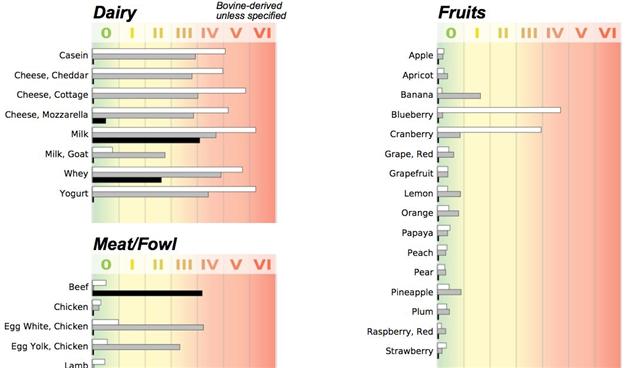Why Food Allergen Elimination at Seattle Naturopathic Center
– According to the United States Department of Agriculture, it is estimated over 34 million people in the United States have food sensitivity-
The underlying cause of intestinal inflammation and immune dysregulation can often be caused by certain foods that you may have difficulty digesting or to which you may have a sensitivity or allergy. In fact, over 50% of the immune system is located in and around the gastrointestinal tract. Therefore, when the gastrointestinal immune system is affected by food allergens or intolerances, the systemic immune system is also impacted. In turn, chemical messengers of alarm and inflammation are released by the gastrointestinal associated immune system that enter the bloodstream and can have an effect upon other organs and systems in the body. For example, drinking milk, in susceptible individuals, may trigger the disturbances such as changes in mood and cognitive performance. Many people find that eliminating common food allergens helps decrease intestinal inflammation and improves symptoms such as fatigue and muscle pain. It is highly recommended that you eliminate the common food allergens while you re-establish a healthy gastrointestinal system.
It is important to eliminate all known or suspected food intolerances. Many individuals who have avoided common and suspected food intolerances have noticed a dramatic improvement in cognitive function, behavior and over all health. In addition, once the “leaky gut” has healed, the avoided foods can gradually be reintroduced.
Food allergens can be identified via eliminating suspected foods and reintroducing foods to see if there are notable symptoms. Another option of identifying food allergens is food allergy blood test. Blood test can show if food allergens create an immediate or a delayed response.

Medical Research on Food Allergies and Chronic Illnesses
“The Elimination Diet as A Diagnostic Tool”, Hedges, Harold H., M.D., AFP Journal, November 1992;46(5):77S-85S.
The author reviews different syndromes which may be affected by foods, including rhinitis, sinusitis, recurrent otitis, laryngeal edema, eustachian tube dysfunction, chronic cough, gastritis, peptic ulcer, inflammatory bowel disease, constipation, diarrhea, gas and bloating, pruritus ani, irritable bowel syndrome, colitis, enuresis, vulvovaginitis, urinary urgency, fatigue, depression, anxiety, headaches, hyperactivity, sleep disturbances, irritability, arthritis, arthralgia, myalgia, irregular heartbeat, tachycardia, eczema, and nonspecific rashes. Commonly accepted diet-related medical illnesses that are nonimmunologic include obesity, diabetes mellitus, hypertension, hyperlipidemia, celiac disease, gouty arthritis, and lactase deficiency. Immunologic diet-related medical illnesses include conjunctivitis, rhinitis, asthma, urticaria, angioedema and allergic gastroenteritis. The author notes that patients can safely be evaluated by a food elimination diet, followed by a specific food challenge at home or in an office setting. The author feels that this elimination and challenge procedure should be added to the medical evaluation of many symptom complexes.
“Food-Specific Serum IgG4 and IgE Titers to Common Food Antigens in Irritable Bowel Syndrome,” Zar S, Benson MJ, et al, Am J Gastroenterol, 2005;100:1550-1557.
In a study of 108 individuals with irritable bowel syndrome (IBS), of whom 52 had diarrhea as the dominant symptom, 32 had constipation as the dominant symptom and 24 had alternating symptoms, compared with 43 controls, the IBS subjects had significantly higher IgG4 titers to wheat, beef, pork and lamb.
Food Allergies and Migraine,” Grant ECG, Lancet, May 5, 1979;966-969.
In 60 migraine sufferers (52 women and 8 men) who completed a 5-day period of withdrawal from their normal diet (subjects consumed lamb, pears and bottled water)…. With the avoidance of 10 common foods, there was a dramatic reduction in the number of headaches per month, with 85% becoming headache-free. Twenty-five percent of the subjects with hypertension also became normotensive.
“Food Allergy in Children”, Hide, D.W., Clinical and Experimental Allergy, 1994;24:1-2.
The awareness of the public, doctors and food manufacturers to the possibly lethal consequences of inadvertent ingestion of a food to which an individual is allergic needs to be heightened. Few individuals realize that food allergy causes as many deaths as reactions to bees and wasps each year.
Happy Patients

